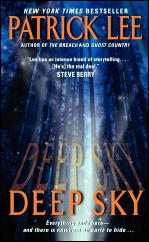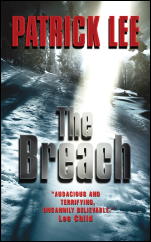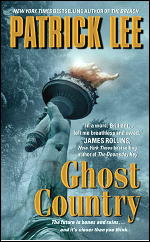Mon 28 May 2012
Review: PATRICK LEE – Deep Sky.
Posted by Steve under Reviews , Science Fiction & Fantasy[2] Comments
PATRICK LEE – Deep Sky. Harper, paperback original, January 2012.
Even though everyone makes up their own, there are certain rules that readers of fiction must live by, and #4 in the spiral notebook that I always carry with me (figuratively speaking) goes something like this:

Never read the third book in a trilogy without reading the first two first.
The proof of a rule always comes in disregarding it, as I did this time, and it will be a long time before I do so again.
Preceding Deep Sky in the author’s “Breach†trilogy are The Breach (December 2009) and Ghost Country (December 2010), and what we have in this, the third book has a a wind-up whizz-bang opening – the roof comes off the top of an ordinary home in the suburbs, a Sparrowhawk missile is fired, destroying the White House and most of its occupants, including the President – followed by an only slightly less dramatic bunker-busting bomb taking out half of the heavily guarded structure containing The Breach, a la Marvel comics – and an ending that veers so far off into sci-fi La-La Land that even the most fervent enthusiast’s eyes will glaze over.

I know. Mine did.
The Breach, as long as you are asking, is some sort of super-secret connection between our world – a wormhole, perhaps – and another, located somewhere else in the galaxy or beyond at some point in time in the future, perhaps. No one knows. All they know is that mysterious artifacts keep slipping through, some useful, others having no discernible purpose.
Whoever ordered the destruction of the White House and the killing of the President is unknown, but the Vice President, hastily sworn in, is definitely on the side of the bad guys. On the other are Travis Chase, head of Tangent, and his lover, Paige Campbell, whose father was one of the founders of Tangent. Both survive the bunker-bomb blast, and with the use of the devices spewed out by the Breach, begin a book-long investigation into the tragedies and who’s behind them, an investigation conducted on the run, with all of the forces of the US Government acting against them, knowingly or not.

The first half of the book is a lot of fun, even though the standalone reader (me) has to assume a lot about the events that have previously taken place. But when events in the previous books are suddenly needed (pulled out of the air) to make sense of this one, the fun ceases and the rest of the book (with 150 pages to go) is a mish-mash of techno-babble, super-sized futuristic technology and carloads of information dumped on the reader with no room to yell out for help. The air is sucked out of the book.
That the leading characters are stick figures goes with saying. (Perhaps we were to have learned all we needed to know about them in the first two books.) This is a techno-thriller, after all, not Moby Dick. The author has a a grand imagination. It’s too bad he couldn’t pull it off, not even in the 150 pages that were left to pull it off in.
This is a Big Scale book — there’s no doubt about that — but when a Big Scale book isn’t given enough space to answer all the questions, nor to fill in the holes in the plot, then it’s no better than a Small Scale book without any questions. (I’m thinking of halves of Ace Doubles from the 1950s and 60s here.)
PostScript: I classified this as Science Fiction, correctly, I believe, but you’re much more likely to find this book in the section where your local store keeps the Tom Clancy thrillers.
May 28th, 2012 at 8:41 pm
Count me in as one who violated that rule and on this particular series as well. I read DEEP SKY and have yet to read the first two, though I do have them.
May 28th, 2012 at 8:51 pm
I don’t have copies of the first two, so I guess I was hoping for the best. I enjoyed maybe the first 250 pages of this third one, then things went downhill quickly for me.
At the moment I have little to no desire to track down the first two, though if I saw used copies somewhere cheap enough, I’m sure I’d buy them. I’ve been around myself long enough to know I would.